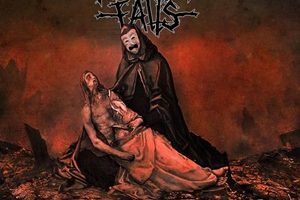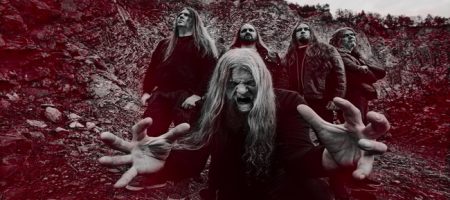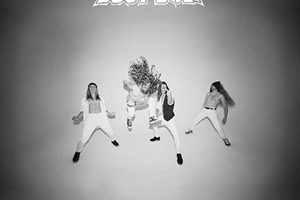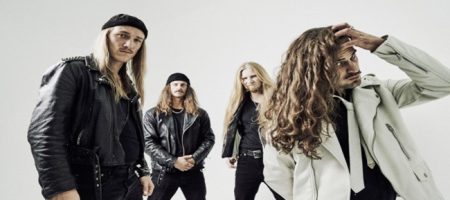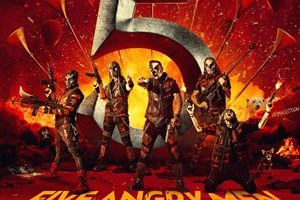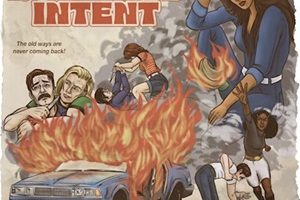Savage Existence – Absorb the Blows to the Head
Tuesday, 25th April 2023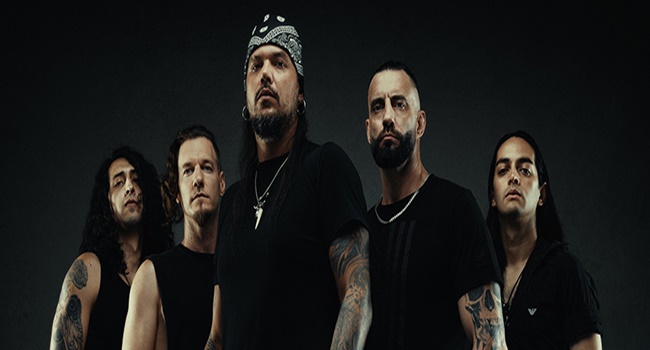
Expanding the global reach of the genre, Savage Existence hails from the Central American country Costa Rica – not exactly a hotbed for heavy metal, but this quintet aim to make their mark through a potent blend of groove metal influences past and present. Releasing their second, self-titled album with producer Logan Mader (Once Human, ex-Machine Head, ex-Soulfly) behind the boards, there’s a channeling of aggression as well as energetic overflow turning personal struggles or strife into triumphant, positive outcomes. We reached out to guitarist Daniel Cleland to give us insight into his musical upbringing, the group contributions to this new record that differ from the previous Animals album, how to properly handle social media as a newcomer act to build attention, discussion of the Costa Rica metal (as well as other genres) scene, how entrepreneurial endeavors aid the cause for tackling the band’s business activities, plus hopes to conquer big stages with big crowds for the future.
Dead Rhetoric: Can you discuss your earliest memories surrounding music in childhood? At what point did you gravitate towards heavier forms of music, and eventually want to pick up an instrument to start performing in bands?
Daniel Cleland: My earliest memory would have been my parents playing Born in the USA, on the record player in my childhood home. That’s heavy in and of itself. I recall liking Lenny Kravitz “Are You Gonna Go My Way”, early on as well. The Wayne’s World soundtrack, it had Alice Cooper, Jimi Hendrix. I remember playing air guitar with a broomstick when I was twelve years old. I really started picking up guitar when I was fourteen years old, Nirvana was still popular. All the girls thought they were the coolest. I picked up an acoustic, my aunt lent it to me, and I started learning tablature from Nirvana. My age group were a couple years too young to jam out to Nirvana, by the time we learned how to play, it went into Silverchair, Sepultura. We got into Pantera into the mid to late 90’s, Sepultura. Playing in my buddies’ basement, he is actually my drummer now Jesse Radford, we played in his parents basement all throughout high school. Lived together after high school, we played a couple of Sepultura songs to warm up and then we would write our own stuff in the same vein.
Dead Rhetoric: Savage Existence is the self-titled second record from the group, the follow-up to 2021’s Animals. How would you assess the differences in terms of performances, songwriting, or anything else from the debut that you applied to this latest effort?
Cleland: Well, the debut was written a lot less intentionally. It was natural and instinctual, it came out just because Jesse and I were getting back into music, we had resurrected some the music we had written back in the day. This was after taking a fifteen-year break, or more even. Jesse is working with me down in Costa Rica, dating my business partner Melissa and he is running our kitchen down here at my retreat center. We started playing together during the pandemic because we were locked down here in Costa Rica, we brought back those old songs, and we went into the studio and wrote some new stuff as well. We banged through all the instrumentals, all eleven songs – there was nobody else’s input on the drums or on the rhythms. Then we brought in the other guys to add to that. Even the lyrics, I wrote most of the lyrics for Animals.
In terms of quality, the sound quality is good because Logan produced it. It was a dream to record something, but it wasn’t let’s go all the fucking way. The second album, we got into it when the other guys were in the band already. We had performed together, we got off a Mexico tour. It has a bit of a different sound. We are trying to find our core sound, but there were a lot more contributions from the other guys. Some of the songs are still pretty aggressive and low-tuned, some of the songs are getting more toward the direction we are heading into. We have Gary Holt on this album too. The second album sounds a lot better, with better compositions. It’s more professional. We are really excited to get it out.
Dead Rhetoric: What was it like getting a guest appearance from Exodus/ex-Slayer guitarist Gary Holt for the record? Also, how did the behind the boards work with Logan Mader shape or enhance the final output for the better?
Cleland: It was awesome to get Gary in the studio of course – he’s such a legend. I got connected to Gary through the final Slayer show – I did a meet and greet and met the guys there, connected really quick and got in touch with Gary afterwards. His solo sounded kick ass, which was cool. Logan, he’s got so much experience in the industry. He was one of the pioneers of groove metal back in the 90’s with Machine Head, and he went to Soulfly. He knows everybody, he’s seen things happen, he’s toured with Dimebag Darrell and Pantera, Ozzy. He has seen the evolution of the entire industry. He knows where all the bodies are buried so to speak. He’s produced a ton of albums, four or five gold selling albums. Five Finger Death Punch, Soulfly, Gojira – bands that are doing big things. DevilDriver, etc. He brings all that to the table, so he’s been very good at mentoring us along the way. He is a wizard behind the board, super-fast, really a genius when it comes to recording, moving everything around, layering things. Mastering as well, he’s a really fantastic producer.
Dead Rhetoric: What sort of topics do you like to discuss in the lyrics? Do you believe it’s important to have interesting, thoughtful content that mirrors the musical attack?
Cleland: Yes, I do believe that’s important. When I write lyrics – it’s a combination of personal things and experiences. It’s meant to be motivational and inspirational. As metal has always served me in that way to overcome personal challenges. I have always appreciated the lyrics of bands like Hatebreed or other bands that inspire a strong mindset. In my case, when I write lyrics, there is a bit of that, and as an entrepreneur I pay attention to world issues – geopolitics, as I need to know the landscape I’m working with when it comes to business. I have an unusual comprehension of that thing, and I include that in my lyrics. Whereas Anton, when he writes lyrics, he’s more in the way of overcoming personal struggles, to relate with people on a personal level. I don’t get as much into that, even if I’m writing about my own personal experience, I tend to write in the third person.
Dead Rhetoric: How important do you believe instant communication technology and social media platforms have been to the growth of your fanbase on a global scale? Do you enjoy the fan interaction through these mediums beyond building the brand of the band through live shows/touring?
Cleland: Well, I think it’s hard to build a social media audience unless you are touring. I’ve never become a fan of a band on social media unless I see really cool shots of them touring or interacting with the crowds. We haven’t seen a ton of growth on social media just from posting music or rehearsals. If you want to grow on social media, you have to have really good visual content being out amongst the people, you need social proof that a lot of people are going to your shows and interacting with the fans. It can be beneficial, but it has to be done correctly. No iPhone side views of the stage, where it sounds like shit. You want 4K zoomed up shots, with the boom, you want to bring the people into that experience of the concert. Of course it’s useful when done properly, but really superfluous and redundant when done incorrectly.
Dead Rhetoric: What is the heavy music scene like in Costa Rica? Are there many outlets for shows/festivals, and what styles seem to go over well these days?
Cleland: There’s a decent metal scene in Costa Rica. Costa Rica is a small country, there’s five million people that live here, including tourists. There is only one major city, and in that one major city there’s only one venue that everybody goes to for the bands – Pepper Club. There is about 2,000 capacity, and another stage in that venue for maybe 1,000. Any major international act of any genre of metal goes to play there, and they usually fill it up. A Lamb of God won’t play there, they will play in a park, Pantera may fill up a stadium. If you are playing in a smaller venue, nobody will know who you are here.
Anything that is reggaeton or Latino goes over well here. Bad Bunny would play double-headers at the national stadium. Coldplay did a double-header at the national stadium. Metal has a fanbase, but not everybody and their girlfriends want to go to it. It ends up being a little too underground, sweaty guys banging into each other. It’s not the vibe that you get the girls from Costa Rica into. Andres plays in a band called Sight of Emptiness. They just played on the 70,000 Tons of Metal boat cruise. There is a power metal band called Wings of Destiny. We are hoping Savage Existence will get more reach than those two bands. Gather a wider range of a fanbase.
Dead Rhetoric: You are planning your first European tour later this month into May with Ross the Boss. What can the fans expect from Savage Existence in terms of a live performance, and how will it feel playing with an early legend of the 80’s metal movement?
Cleland: We are going to destroy, kill it. We are sounding super tight. A couple of the guys have been having personal struggles as well, so wait until that comes out on stage. I built a rehearsal studio in my house, everything is set up all the time, we jam out here. We will rock the house. We are trying to play our less heavy stuff so we don’t set the show up for disaster. The Ross the Boss guys are kick ass. And we are honored to be touring with those guys, to tour with such an established, early metal legend like that.
Dead Rhetoric: How would you describe the band chemistry and interaction among the members? Do you share in the responsibilities/focus of business details beyond the musical responsibilities?
Cleland: The chemistry is awesome – we have a really good vibe among the team. We have no typical band issues of extreme drug abuse. We don’t have any real, acute problems. The hierarchy is pretty clear – no arguments and ego battles. Everybody is respectful, we joke around a ton. We have a diversity of talent for the team. Anton and I, we are both entrepreneurs – we own businesses, we handle a lot of executive decisions. I am funding everything. Jesse is a graphic designer and a web designer, so he does the digital stuff. Danny and Andres are pretty much musicians – they don’t get involved with the business stuff.
Dead Rhetoric: As you said, Anton and you are entrepreneurs. Are there things that happened in your businesses and careers that you’ve learned to apply to the music business model?
Cleland: Everything. You aren’t starting a band these days- you are starting a business. No question about it. I just published a book called 12 Laws of the Jungle – How to Become a Lethal Entrepreneur. 12 Laws Book Every single one of those principles applies to starting a band as it does to any business. You have to build a team. You have to raise money. You have to develop your product. You have to find a market. You have to distribute the product to that market. You have to have the right mindset, things are going to happen, you might lose people, you may have to fire someone, legal problems. You have to prepare for winter. For example, all of a sudden, a pandemic happens, and you can’t tour for two years, what will you do? You have to figure out social media. Everything you have to do as a band these days it’s not just about getting good at your instruments, you are building a business. It’s very difficult, and if you don’t do the business part right, you won’t do the music part right, because nobody will ever hear your music.
Dead Rhetoric: What would you say are three of the most important albums that helped shape your outlook on the metal genre – and what’s the most special concert memory you have, attending the show as a member of the audience?
Cleland: Top three albums – because it was the first album in this genre that really hooked me was Sepultura – Roots. And that’s really how I started learning to play metal guitar, based on that music. It’s a big influence on my evolution. Burn My Eyes – Machine Head. Part of that is because of Logan. A toss-up between a Hatebreed album, with maybe a combo of the first three Slipknot albums.
Favorite concert memory. I have had some good ones. I saw Slipknot in 1999, and they lit the whole stage on fire, before they got huge. I saw them in a small venue in London, Ontario. I saw the final Slayer show. I got invited to the Burn My Eyes reunion tour in Denver, Colorado just before the pandemic shut everything down. I went backstage and hung out with the band. I saw Soulfly and System of a Down in 1998- Logan was playing guitar with Soulfly. I recall that, but System of a Down was more impressive to me than Soulfly. Cannibal Corpse concerts as well. Machine Head in Australia, just after they released The Blackening and Phil Demmel crowd surfed all the way from the front to the back of the crowd.
Dead Rhetoric: How do you view the state of the music industry currently? Are there aspects you are happy about, and if you could make any changes, what would you like to see improved upon?
Cleland: It’s a lot more treacherous than I thought. It pays a lot less than what I thought. If I could change one thing, the musicians would get a better paycheck. You have some guys that might be super famous, they might have good distribution and fame, but they are working construction on the side and live in a shitty little apartment, just trying to keep the kids alive. It’s a tough nut to crack. The music industry is not in the best state it’s ever been, especially for smaller bands. If bands blow up in other genres, it’s easier to generate revenue from music. In the metal world, it’s a little bit tough. It would be nice if it would pay a little bit better.
Dead Rhetoric: What are some of the short-term and long-term goals you set out to achieve with Savage Existence?
Cleland: Short term is to get as many live dates to play as possible. We are trying to get out and play. We are working on our third album. For long term, we are trying to expand the reach of metal. Create a version of metal that is still heavy and aggressive, but somehow brings in a broader range of fans. We want to be playing bigger venues, make money. I’ve been in business long enough that I’m doing okay, financially – the other guys want to make money, and they practice every single day. We are trying to get there, brick by brick.
Dead Rhetoric: What does success mean to your personally? Has that definition changed from the early days you learned your craft to today?
Cleland: It’s really always been big shows. We want to be selling out arenas. If you say what’s your goal, I’d say 30,000 people in a stadium. How do we get there? I don’t know, we are working on it. As close to that as we can get, that’s how I’ll measure success going forward.











